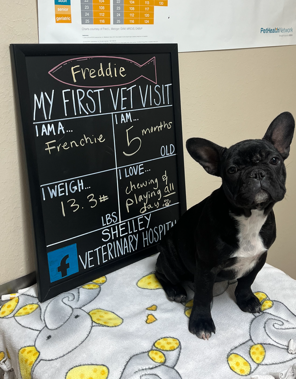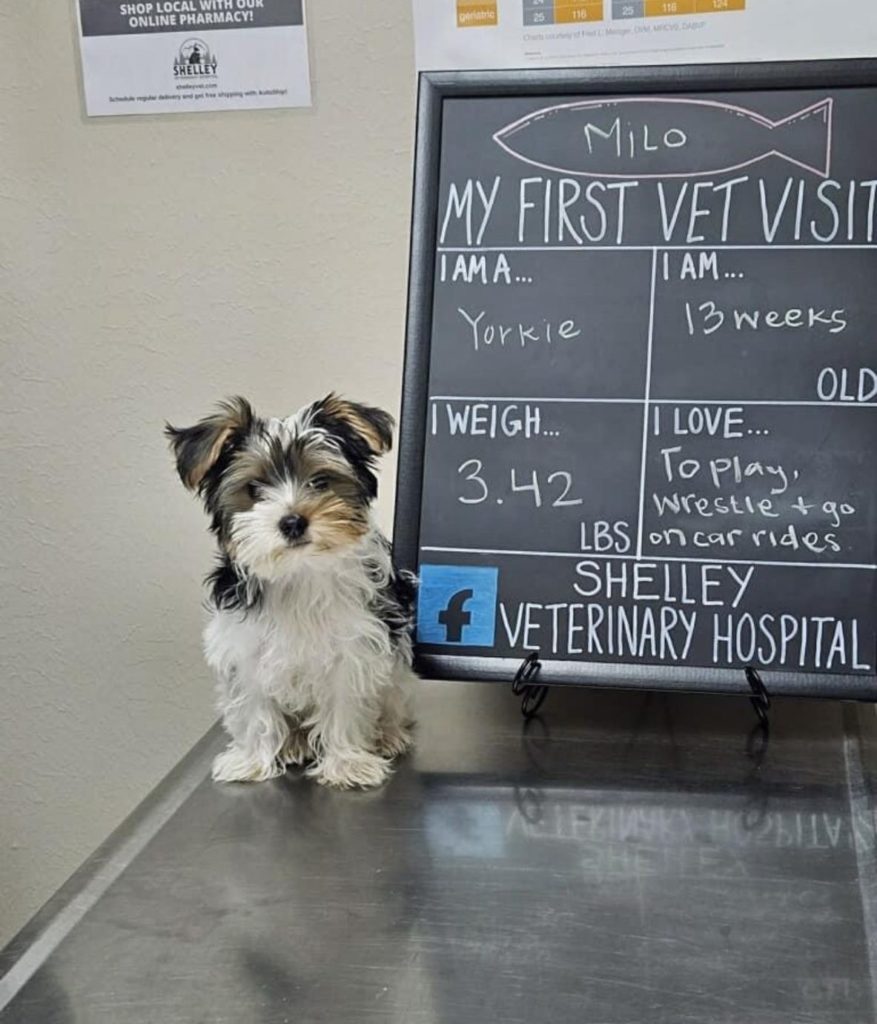It is our pleasure to welcome your new puppy! Caring for your new family member can be challenging and even stressful at first. We are here to help! There is so much information out there that can be confusing and contradictory. To help you navigate this new adventure, we have brought the best information and resources directly to you. Below you can find helpful tips and tricks and things you can do to make this transition as smooth and positive as possible. Our goal is to keep your pet as happy and healthy as long as possible and this is a great place to start! If you have any additional questions or need anything at all, please call us at 208-357-5100.
Vaccinations
All dogs, whether they stay at home or travel, are at risk of exposure to various infectious diseases. The first step in properly protecting them is education and knowing what steps need to be taken to protect your furry friend. Vaccinations stimulate the production of protective antibodies that neutralize viruses or bacteria. Vaccinations allow us to prevent infectious diseases instead of your puppy becoming sick and needing treatment. Vaccinations are also the most cost-effective strategy to maintaining your puppy’s health. We recommend your puppy avoid contact with other dogs and various locations until the full vaccination series is complete. There are several viruses and bacterial infections that your puppy may encounter that are lifestyle specific. We are here to help you understand and know which vaccinations are right for your puppy.
Distemper Virus (CDV)
This virus spreads throughout the body. Signs may include fever, lung infection, seizures, skin lesions, and immune suppression. Complications of this disease can be long term damage to the nervous system, damage to teeth and bones, and even death.
Adenovirus 1 (CAV-1)
Common signs are fever, vomiting, diarrhea, and can spread to the liver, kidneys, and eyes. Complications can include damage to the liver and kidneys, and death.
Adenovirus 2 (CAV-2)
A cough, runny nose, difficulty breathing, fever, poor appetite, and lung infection are all clinical signs of this virus. Complications include severe pneumonia (lung infection), which can lead to death.
Parainfluenza (CPiV)
Symptoms include cough, runny nose, difficulty breathing, fever, poor appetite, and lung infection.
Parvovirus (CPV)
Parvovirus is the most common virus contracted by puppies in our area. Clinical signs include fever, vomiting, bloody diarrhea, bone marrow suppression, and heart damage. Severe illness can lead to death.
Leptospirosis (L4) 4 types
Clinical signs are fever, lethargy, and vomiting. This virus can progress to liver damage, kidney damage, or affect the eyes. These are zoonotic, meaning they are contagious to humans.
Bordetella bronchiseptica
This upper respiratory virus can cause a cough, runny nose, difficulty breathing, fever, and poor appetite. It can lead to severe pneumonia leading to death.
Rabies
Rabies is a fatal, viral disease that can be spread between multiple species, including humans. Vaccination against this virus is required by law in most cities and states and is required in the State of Idaho. Clinical signs are aggression, disorientation, drooling, seizures, and death.
Following this specific guideline is critical in protecting your puppy from these diseases. Your puppy should be vaccinated every 3 to 4 weeks until they are 16 weeks old. Our recommended timetable is as follows:
7-8 weeks of age – Vaccinate against Distemper, Adenovirus 1 & 2, Parainfluenza, and Parvovirus
11-12 weeks of age – Vaccinate against Distemper, Adenovirus 1 & 2, Parainfluenza, and Parvovirus. If lifestyle requires, also vaccinate against Leptospirosis (4 subtypes)
15-16 weeks of age – Vaccinate against Distemper, Adenovirus 1 & 2, Parainfluenza, Parvovirus and Rabies. If lifestyle requires, also vaccinate against Leptospirosis (4 subtypes) and/or Bordetella Bronchiseptica
*If you missed the start of this timeline, do not worry. It is not too late. Call us and we can set a vaccination schedule for you based on the age your puppy and what will work for you. *
Some puppies may experience mild side effects following vaccinations. These typically start within a few hours of the vaccination and typically do not persist more than a few days. These symptoms are typically mild and are a normal response of your puppy’s immune system during the process of developing protective immunity. Common symptoms may include mild fever, decrease in social behavior, diminished appetite or activity, sneezing or other respiratory signs, or discomfort or mild swelling at the injection site. In rare cases, your puppy may experience more severe symptoms such as swelling of the face and legs, repeated vomiting or diarrhea, whole-body itching, difficulty breathing, or collapse. Again, these symptoms are very rare, but should your puppy experience any of the more severe symptoms, please call us as soon as possible or bring your puppy back to our clinic as soon as possible for treatment.
Spaying/Neutering
We strongly recommend having your puppy spayed (female) or neutered (male). If your puppy will be less than 40 pounds at their adult weight, our veterinarians recommend spaying or neutering your puppy at 4 to 6 months of age. If your puppy will be over 40 pounds at their adult weight, our veterinarians recommend spaying or neutering at 1 year of age. A spay procedure involves the removal of both ovaries and the uterus from the abdominal cavity. A neuter procedure removes the testicles from the scrotum. Spaying or neutering your pet at a young age significantly decreases health and behavior problems, especially in male dogs.
Nutrition
Your puppy must receive proper nutrition, and these nutritional needs will vary throughout their lifetime. Not all diets are created equal, and a quality diet is very important for your puppy’s health. Your puppy will digest premium food more completely, have a less odiferous stool, and help with potty training. Poorer-quality dog foods can contain excessive amounts of protein, sodium, phosphorus, magnesium, and other types of fillers that can negatively affect your puppy’s health. There is a large variety of options out there and we understand it can be overwhelming. We are here to help! For a diet to be a quality diet, it must meet a very specific set of criteria. The World Small Animal Veterinary Association (WSAVA) has a list of recommendations for selecting food for your pet. The diet you select should hit every mark on this guideline. The following link will provide you with a list of guidelines. Please note that we are always here to help. If you have any questions or would like us to make a recommendation for you, feel free to reach out to us. Your pet’s health is our number one priority and that all starts with proper nutrition.
Grooming
Beyond keeping your puppy looking great and feeling frisky, regular grooming is important to your pet’s health. Bathe your puppy with a mild, hypoallergenic shampoo that is gentle on sensitive skin. You mustn’t use people’s shampoo on your puppy. Some dog breeds need regular grooming and trimming, especially if they have fur that continues to grow. Be sure to schedule that first puppy grooming early in life, once fully vaccinated, to help your puppy adjust to the grooming process more easily. Routine bathing and grooming helps prevent skin and ear infections, torn nails, and anal gland issues.
https://www.purina.com/articles/dog/puppy/feeding/feeding-puppies
Parasites
We recommend deworming puppies to ensure their health and prevent transmission of parasites. Your puppy will receive an oral dewormer for roundworms at their first puppy visit. You will also be provided with a follow-up dose that you will give your puppy by mouth at home 14 days after your visit. It is recommended for dogs to have routine fecal examinations performed to check for intestinal parasites such as roundworms, tapeworms, hookworms, and whipworms. Tapeworms can be contracted by ingesting species such as mice and birds, or by ingesting infected fleas. Tapeworms attach to the small intestines, stealing nutrients and can cause vomiting and weight loss. Some tapeworms can be found around a dog’s rectum and look like small pieces of rice. Roundworms can be picked up from walking or digging through contaminated soil. Roundworms can cause vomiting, diarrhea, and malnourishment. These are the two most common intestinal parasites in our area, however, there are several others that your puppy may contract, especially if traveling outside the area. Use the following link for more information.
https://www.zoetispetcare.com/blog/article/intestinal-worms-in-dogs
Ticks and Heartworm
Infected ticks carry bacteria and can bite your dog, spreading infection. They carry several diseases, such as Lyme disease, ehrlichiosis, and Anaplasmosis. Symptoms of these diseases include bloody nose, fever, lack of energy, lameness, loss of appetite, painful joints, and pale gums, and they can even be symptom-free. Progression of these diseases, if not treated, includes autoimmune diseases, bleeding complications, chronic joint pain, damaged joints, kidney disease, low platelet count, low white blood cell count, and death.
Infected mosquitoes spread worm larvae from infected dogs to your dog, resulting in heartworm disease. Symptoms include mild cough, reduced appetite, reluctance to move or exercise, and weight loss. If not caught early and treated, this disease can result in heart failure, lung disease, and death.
The best way to protect your pet from these diseases is by using tick and heartworm preventatives. Though it is recommended for your pet to receive these preventatives year-round, in our area, it is especially important during the summer months when ticks and mosquitos are the most prevalent. Though heartworms are rarely diagnosed in this area, they can still occur, so it is recommended to keep your pet on a heartworm preventative. Especially if you travel outside this area with your pet, we recommend your pet receive preventatives for fleas, ticks, and heartworms. The following are products that we recommend to keep your pet safe. Please let us know if you have any questions or to discuss the right recommendations for your pet. These products can be purchased through us directly in the clinic, or through our online store, or we can provide you with a written script for you to purchase through a vendor of your choice. As these products are prescription only, we are required to examine your pet once per year to authorize use.
Prevents heartworm, treats and controls common intestinal parasites, including roundworms, hookworms, whipworms, and tapeworms: https://my.elanco.com/us/interceptor-plus
Potty training
House training can be difficult and frustrating in the beginning, but most puppies catch on by five months of age. Always remember to positively praise your puppy when he or she does well. A small treat given when your puppy does the wanted behavior, such as urinates or defecates outside, reinforces the good behavior. Here are some resources that you may find helpful while potty training your new furry housemate.
https://www.purina.com/articles/dog/puppy/training/how-to-potty-train-a-puppy
https://www.humanesociety.org/resources/how-potty-train-your-dog-or-puppy
Puppy Training
Training your puppy is critical to ensure a positive and rewarding life with your new furry friend. Training should start right away and be maintained throughout your pet’s lifetime. We recommend starting with puppy classes, once your puppy is fully vaccinated. These training classes will not only help you learn how to properly train your puppy, but they are also great for socialization. Your puppy must meet as many other dogs and cats as possible, as well as people. Proper socialization will help your puppy to be comfortable around people and other animals, which will reduce the risk of negative interactions and potentially risky situations. This will also help your puppy to be comfortable with their Veterinary visits. Here are several resources to help you to properly train your puppy and help reduce future issues, such as anxiety and other behavioral issues.
https://www.purina.com/articles/dog/puppy/training
https://www.akc.org/expert-advice/training/how-to-potty-train-a-puppy/
https://www.purina.com/articles/cat/behavior/training/how-to-introduce-cats-and-dogs
614 N State St,
Shelley, ID 83274
Monday: 7:30 am – 5:00 pm
Tuesday: 7:30 am – 5:00 pm
Wednesday: 7:30 am – 5:00 pm
Thursday: 7:30 am – 5:00 pm
Friday: 7:30 am – 5:00 pm
Saturday: Closed
Sunday: Closed
Surgery Drop Off Time: 7:30 am – 8:30 am




